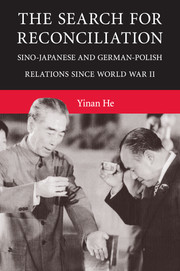Description
The Search for Reconciliation
Sino-Japanese and German-Polish Relations since World War II
Author: He Yinan
Focusing on two case studies from East Asia and Europe, Yinan He argues that the key to interstate reconciliation is the harmonization of national memories.
Language: English
Subject for The Search for Reconciliation:
Approximative price 39.35 €
In Print (Delivery period: 14 days).
Add to cart
The Search for Reconciliation
Publication date: 12-2015
Support: Print on demand
Publication date: 12-2015
Support: Print on demand
Approximative price 112.82 €
Subject to availability at the publisher.
Add to cart
The search for reconciliation: sino-japanese and german-polish relations since world war two
Publication date: 04-2009
380 p. · 16x23.5 cm · Hardback
Publication date: 04-2009
380 p. · 16x23.5 cm · Hardback
Description
/li>Contents
/li>Biography
/li>
Why have some former enemy countries established durable peace while others remain mired in animosity? When and how does historical memory matter in post-conflict interstate relations? Focusing on two case studies, Yinan He argues that the key to interstate reconciliation is the harmonization of national memories. Conversely, memory divergence resulting from national mythmaking harms long-term prospects for reconciliation. After WWII, Sino-Japanese and West German-Polish relations were both antagonized by the Cold War structure, and pernicious myths prevailed in national collective memory. In the 1970s, China and Japan brushed aside historical legacy for immediate diplomatic normalization. But the progress of reconciliation was soon impeded from the 1980s by elite mythmaking practices that stressed historical animosities. Conversely, from the 1970s West Germany and Poland began to de-mythify war history and narrowed their memory gap through restitution measures and textbook cooperation, paving the way for significant progress toward reconciliation after the Cold War.
Introduction; 1. Explaining deep interstate reconciliation; 2. When east meets west: postwar West German-Polish reconciliation; 3. Initial isolation: pre-normalization Sino-Japanese reconciliation; 4. The 'honeymoon' period: Sino-Japanese relations, 1972–81; 5. An old feud comes back: Sino-Japanese relations in the 1980s; 6. Volatility and downward spiral: Sino-Japanese relations from the 1990s to the present; Conclusion; Appendix; Bibliography.
Yinan He received her PhD in Political Science from the Massachusetts Institute of Technology in 2004 and is currently Assistant Professor at the John C. Whitehead School of Diplomacy and International Relations at Seton Hall University, New Jersey. She was a postdoctoral research associate of the Princeton-Harvard China and the World Program in 2007–8, An Wang Postdoctoral Fellow in Chinese Studies at Harvard University, Massachusetts in 2004–5, John M. Olin Predoctoral Fellow in National Security at Harvard University in 2003–4, and research student at the University of Tokyo in 1999–2001, sponsored by the Japanese Government Mombusho Scholarship. She holds a BA from Peking University, Beijing and an MA from Fudan University, Shanghai in international politics.
© 2024 LAVOISIER S.A.S.




